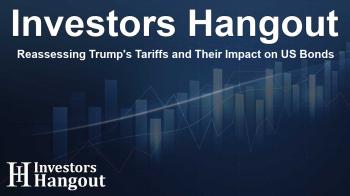Reassessing Trump's Tariffs and Their Impact on US Bonds

Tariffs as a Financial Shield Amid Global Market Instability
The recent upheaval in global bond markets has cast a shadow over many economies, yet President Donald Trump's tariffs appear to be providing unexpected benefits to the United States. Initially met with skepticism, these tariffs are now helping maintain investor confidence and stability, effectively shielding the nation from the worst impacts of global financial turmoil.
Global Government Debt Reaches Unprecedented Levels
As we witness global government debt surpassing the staggering $97 trillion mark, stresses in developed nations are noticeable. Countries like Japan, the U.K., and France are grappling with heightened debt levels, resulting in investors searching for higher yields. The situation escalated further as pandemic spending and recovery measures have doubled the debt levels since 2010, outstripping corporate and household borrowing, according to recent analyses.
Investors Stand Firm on U.S. Treasuries
Despite U.S. public debt reaching an all-time high of $30 trillion, the demand for U.S. treasuries remains strong and unwavering. Specifically, the yield on the 30-year Treasury bond is poised to approach 5%, yet the increase has been marginal compared to shorter-term securities. One of the core reasons driving this optimism lies in forecasts from the Congressional Budget Office, suggesting that tariffs could generate approximately $3.3 trillion over the next decade. This prospect significantly alleviates concerns related to fiscal fragility.
How Tariffs Are Easing Fiscal Concerns
The reassessment of these tariffs has become beneficial in fostering investor reassurance. With the U.S. economy showing signs of resilience, the potential for a Federal Reserve interest rate cut also enhances the attractiveness of U.S. treasuries. Priya Misra, a bond portfolio manager at J.P. Morgan Asset Management, reflects this sentiment: "The U.S. is outperforming because our [budget] deficit is marginally better with tariffs. Forget the economic justification of tariffs; they are raising considerable revenue." In addition, there is a strong belief that the president may reinstate previously overturned tariffs, ensuring a continuous influx of revenue from import duties.
The Ripple Effect: Rising Yields Impacting High P/E Stocks
However, rising yields could create challenges for high price-to-earnings (P/E) stocks, including Tesla Inc. (NASDAQ: TSLA), NVIDIA Corporation (NASDAQ: NVDA), and Palantir Technologies Inc. (NASDAQ: PLTR). Gary Black, Managing Director of The Future Fund LLC, emphasizes the risk associated with these sectors due to the increasing 10-year Treasury yields.
Concerns Over Potential Market Bubble
Additionally, analysts from Deutsche Bank are raising alarms over NVIDIA’s soaring market capitalization, suggesting it might be indicative of a potential bubble in the U.S. equities market. With the yields rising, it raises significant questions about how sustainable these high valuations can be, particularly for stocks characterized by lofty P/Es.
Conclusion: Navigating the Complex Financial Landscape
Trump's tariffs, while contentious, have emerged as a significant factor in the economic landscape. They seem to provide a buffer that helps the U.S. maintain a balance amid escalating global debt issues. Looking ahead, as long as these tariffs remain implemented and investor confidence continues to grow, the stability seen in U.S. treasuries could persist. Investors will continue to watch interest rates, sector performances, and inflation trends, crucially considering how these elements influence their strategies and market decisions.
Frequently Asked Questions
What is the current state of global government debt?
Global government debt has surpassed $97 trillion, primarily influenced by pandemic-related spending and recovery measures, doubling since 2010.
How have U.S. tariffs affected investor confidence?
Investors view tariffs as a revenue source that could improve the U.S. budget deficit, ultimately boosting confidence in U.S. treasuries despite rising public debt.
What risks are high P/E stocks facing?
High P/E stocks like Tesla, NVIDIA, and Palantir are at risk due to rising Treasury yields, which could pressure their valuations as borrowing costs increase.
What revenue is expected from tariffs over the next decade?
The Congressional Budget Office estimates that tariffs could generate around $3.3 trillion in revenue over the next ten years.
How are traders reacting to rising Treasury yields?
Traders are increasingly cautious about high P/E stocks, expecting their valuations to face headwinds as yields continue to rise in the market.
About The Author
Contact Olivia Taylor privately here. Or send an email with ATTN: Olivia Taylor as the subject to contact@investorshangout.com.
About Investors Hangout
Investors Hangout is a leading online stock forum for financial discussion and learning, offering a wide range of free tools and resources. It draws in traders of all levels, who exchange market knowledge, investigate trading tactics, and keep an eye on industry developments in real time. Featuring financial articles, stock message boards, quotes, charts, company profiles, and live news updates. Through cooperative learning and a wealth of informational resources, it helps users from novices creating their first portfolios to experts honing their techniques. Join Investors Hangout today: https://investorshangout.com/
The content of this article is based on factual, publicly available information and does not represent legal, financial, or investment advice. Investors Hangout does not offer financial advice, and the author is not a licensed financial advisor. Consult a qualified advisor before making any financial or investment decisions based on this article. This article should not be considered advice to purchase, sell, or hold any securities or other investments. If any of the material provided here is inaccurate, please contact us for corrections.

